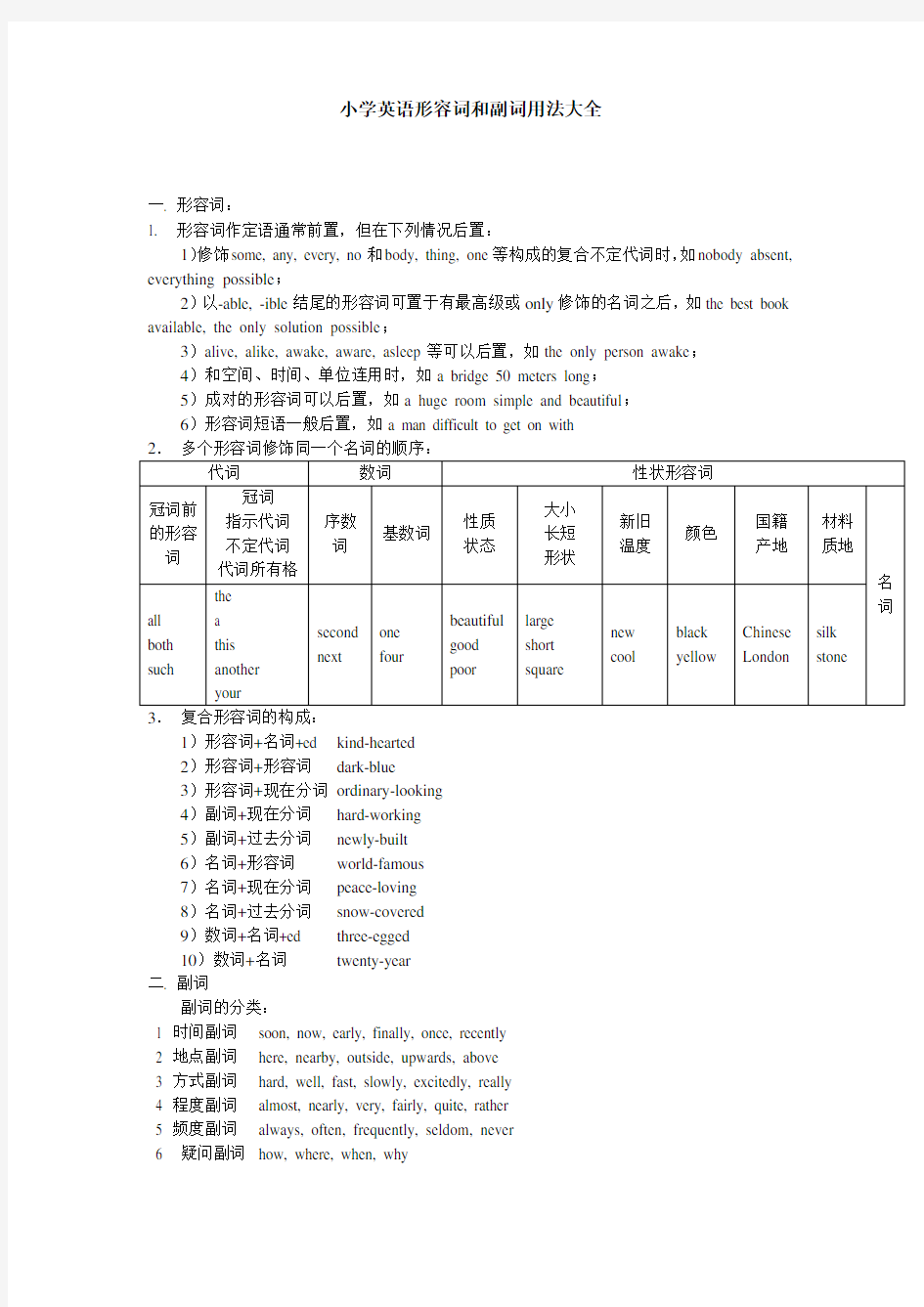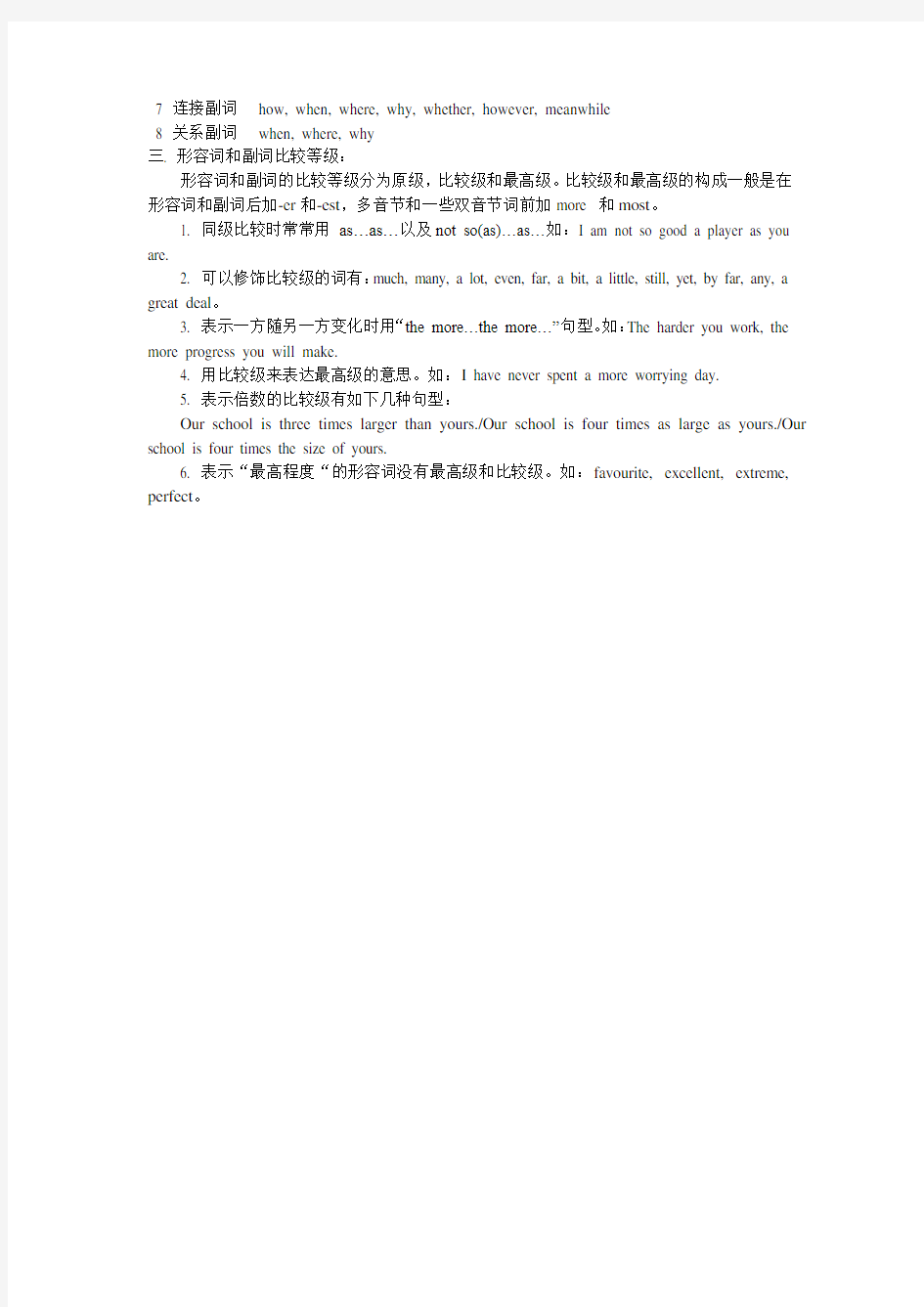

小学英语形容词和副词用法大全
一. 形容词:
1. 形容词作定语通常前置,但在下列情况后置:
1)修饰some, any, every, no和body, thing, one等构成的复合不定代词时,如nobody absent, everything possible;
2)以-able, -ible结尾的形容词可置于有最高级或only修饰的名词之后,如the best book available, the only solution possible;
3)alive, alike, awake, aware, asleep等可以后置,如the only person awake;
4)和空间、时间、单位连用时,如a bridge 50 meters long;
5)成对的形容词可以后置,如a huge room simple and beautiful;
6)形容词短语一般后置,如a man difficult to get on with
3.复合形容词的构成:
1)形容词+名词+ed kind-hearted
2)形容词+形容词dark-blue
3)形容词+现在分词ordinary-looking
4)副词+现在分词hard-working
5)副词+过去分词newly-built
6)名词+形容词world-famous
7)名词+现在分词peace-loving
8)名词+过去分词snow-covered
9)数词+名词+ed three-egged
10)数词+名词twenty-year
二. 副词
副词的分类:
1 时间副词soon, now, early, finally, once, recently
2 地点副词here, nearby, outside, upwards, above
3 方式副词hard, well, fast, slowly, excitedly, really
4 程度副词almost, nearly, very, fairly, quite, rather
5 频度副词always, often, frequently, seldom, never
6 疑问副词how, where, when, why
7 连接副词how, when, where, why, whether, however, meanwhile
8 关系副词when, where, why
三. 形容词和副词比较等级:
形容词和副词的比较等级分为原级,比较级和最高级。比较级和最高级的构成一般是在形容词和副词后加-er和-est,多音节和一些双音节词前加more 和most。
1. 同级比较时常常用as…as…以及not so(as)…as…如:I am not so good a player as you are.
2. 可以修饰比较级的词有:much, many, a lot, even, far, a bit, a little, still, yet, by far, any, a great deal。
3. 表示一方随另一方变化时用“the more…the more…”句型。如:The harder you work, the more progress you will make.
4. 用比较级来表达最高级的意思。如:I have never spent a more worrying day.
5. 表示倍数的比较级有如下几种句型:
Our school is three times larger than yours./Our school is four times as large as yours./Our school is four times the size of yours.
6. 表示“最高程度“的形容词没有最高级和比较级。如:favourite, excellent, extreme, perfect。
副词 副词是一种用来修饰动词、形容词、其他副词和整个句子的词,说明时间、地点、程度、方式和频率等等。 一、副词的分类 1、时间副词:today(今天)、tomorrow(明天)、yesterday(昨天)、tonight(今晚)、now(现在)、 before(以前)、ago(以前)、just now(刚才)、then(那时) 2、地点副词:here(这里)、there(那里)、home(在家)、upstairs(在楼上)、downstairs(在楼下) 、 away(在远处) 3、频度副词:usually(通常)、often(经常)、always(总是)、sometimes(有时)、once(一次、一旦)、 hardly(几乎)、ever(曾经)、never(从来不)、 5、疑问副词:why(为什么)、what(什么)、where()、when、how 4、程度副词:too(太)、very(很)、so(那么)、quite(很、相当)、much(非常)、a little(一点) 6、方式副词:quietly(安静地)、warmly(热情地)、slowly(慢慢地)、carefully(小心地)、badly(严重地)、 seriously(认真地)、hard(艰难地、猛烈地)、fast(快速地) 二、副词的位置 1、副词修饰动词时,也有放在句首、句中或句末。如: Usually I go shopping on Sundays.---通常我周日去购物(句首) It very often rains in July.---七月份经常下雨(句中) He runs very fast.---他跑的很快(句末) 大多数副词都可以放在动词后面,如果动词带有宾语,副词就放在宾语后面。例如: dance beautifully、listen carefully、sit quietly、speak loudly、very happy I get up early in the morning every day. ---我每天早晨都很早起床。 We can go to this school freely. ---我们可以免费到这家学校学习。 需要注意的是,大多数方式副词位于句尾,但宾语过长,副词可以提前,以使句子平衡。例如: We could see very clearly a strange light ahead of us.---我们清楚地看到前面有奇怪的光。 2、副词修饰形容词或副词时,通常放在形容词或副词的前面。如: These flowers are quite beautiful.---这些花相当漂亮(在形容词前) He studies very hard.---他学习很努力(在副词前) 3、enough作为副词修饰形容词或副词时,要位于它所修饰的形容词或副词的后面。如: Lily is not old enough to look after herself.---莉莉太小,还不能够照顾自己。 4、方式副词well、badly、hard等只放在句尾。如: He speaks English well. ---他英语说得好。 记忆口诀:形名动副系形副形 1、形名---形容词修饰名词,如:a young girl 2、动副---副词修饰动词,如:run quickly 3、系形---系动词后面跟形容词,如:is lovely 4、副形---副词修饰形容词,如:very good
Name _____________ Date _____________ III 圈出正确的选项 1.Snow White is a (beautiful, beautifully) girl. 2. The dog is dancing (happy, happily). 3.He is (angry, angrily) with me. 4 Listen (careful, carefully). 5.Don’t drive so (quick, quickly). 6 He looks (tired, tiredly) today. IV翻译 (1)比较级的常用句型: 比较级+ than。 如I am taller than you. /I work harder than you./Who is richer, Ma Yun or Wang Jianlin? 1.海豚比鲸鱼游得快。_____________________________________________________________ 2.我比我爹起得早。_______________________________________________________________
3.Messi的足球踢得比Beckham好。_________________________________________________ 4.张老师和范冰冰谁更漂亮?_______________________________________________________ 5.语文和数学,哪科更容易?_________________________________________________________ (2)最高级常用句型: the + 最高级。 如Who is the richest man in the world? Bob is the tallest boy in our class. 6.世界上最小的鸟是什么鸟?_________________________________________________________ 7.大象是最大的陆地动物。_____________________________________________________________ 8.八月份是一年中最热的季节。_________________________________________________________ 9.我的画是全班最难看的了。____________________________________________________________ 10.我最擅长吃、睡、玩。________________________________________________________________ (3)同级比较常用句型:as … as 如Her hair is as black as ebony. Her lips are as red as blood. Her skin is as white as snow. So she is called Snow White. (她的头发像乌木一样黑,她的嘴唇像血一样红,她的皮肤像雪一样白。所以她叫白雪公主) 11.Tom和Jack一样高。________________________________________________________________ 12.Fred和May跑得一样快。______________________________________________________________ 13.我每天像蜜蜂一样忙碌。_____________________________________________________________
小学英语语法 副词 副词的意义:用来修饰动词、形容词、其他副词和全局的词,表示时间、地点、程度、方式等。副词根据他们的意义,可以分为时间副词、地点副词、方式副词、程度副词和疑问副词。 The house is very small. My answer is quite easy. 副词的分类: 时间副词:today, tomorrow, yesterday, always, often, now, before 地点副词:here, there, down, up, down 方式副词:slowly, badly, hard, fast 程度副词:very, much, still, almost, too 疑问副词:why, what, where, when,how 副词的位置 副词修饰动词、动名词、名词是,通常放在被修饰词后。 I’m working carefully. He has never visited the Great Wall. 副词修饰形容词、副词时,通常位于被修饰的词前。 The book is very interesting, I like it very much. She swims quickly enough. 副词修饰数词时,通常位于数词前。 The women is over forty, but she looks very young. 副词的排列顺序 副词表示时间地点时,小单位在前,大单位在后。 Next week, I’ll reach Kunming, China. Lucy was born on November 12th,1985,in Changchun, Jilin Province.
小学英语常见形容词及比较级、最高级变化一览表 1.在形容词词尾加上“er”“est”构成比较级、最高级: bright(明亮的)—brighter—brightest young(年轻的)—younger—youngest cheap(便宜的)—cheaper—cheapest clean(干净的)—cleaner—cleanest clever(聪明的)—cleverer—cleverest cold(寒冷的)—colder—coldest cool(凉的)—cooler—coolest dark(黑暗的)—darker—darkest deep(深的)—deeper—deepest warm(温暖的)—warmer—warmest fast(迅速的)—faster—fastest few(少的)—fewer—fewest great(伟大的)—greater—greatest hard(困难的,硬的)—harder—hardest high(高的)—higher—highest kind(善良的)—kinder—kindest light(轻的)—lighter—lightest long(长的)—longer—longest loud(响亮的)—louder—loudest low(低的)—lower—lowest near(近的)—nearer—nearest new(新的)—newer—newest poor(穷的)—poorer—poorest quick(快的)—quicker—quickest quiet(安静的)—quieter—quietest rich(富裕的)—richer—richest short(短的)—shorter—shortest slow(慢的)—slower—slowest small(小的)—smaller—smallest smart(聪明的)—smarter—smartest strong(强壮的)—stronger—strongest weak(弱的)—weaker—weakest sweet(甜的)—sweeter—sweetest tall(高的)-taller-tallest thick(厚的)—thicker—thickest 2.双写最后一个字母,再加上“er”“est”构成比较级、最高级: big(大的)—bigger—biggest fat(胖的)—fatter—fattest hot(热的)—hotter—hottest wet(湿的)—wetter—wettest thin(瘦的)—thinner—thinnest 3.以不发音的字母e结尾的形容词,加上“r”“st”构成比较级、最高级: close(接近的)—closer—closest fine(好的,完美的)—finer—finest large(巨大的)—larger—largest late(迟的)—later—latest nice(好的)—nicer—nicest safe(安全的)—safer—safest strange(奇怪的)—stranger—strangest wide(宽广的)—wider—widest 4.以字母y结尾的形容词,把y改为i,再加上“er”“est”构成比较级、最高级:busy(忙碌的)—busier—busiest dirty(脏的)—dirtier—dirtiest dry(干燥的)—drier—driest early(早的)—earlier—earliest easy(容易的)—easier—easiest friendly(友好的)—friendlier—friendliest funny(好玩的)—funnier—funniest happy(开心的)—happier—happiest healthy(健康的)—healthier—healthiest heavy(重的)—heavier—heaviest
小学英语里有哪几种词性? 小学英语里有哪几种词性?比如:名词,动词,形容词 一、名词:名词是表示人、动物、物品以及抽象概念的词。 (1)专有名词:表示特定的人或食物名称的词叫做专有名词。 (2)可数名词:可以用数字一个一个数出来的名词,叫做可数名词。 (3)不可数名词:不可以用数字一个一个数出来的名词,叫做不可数名词。 二、冠词:冠词是用在名词前面,说明名词所表示的人或事物的词。 (英语中的冠词一共有三个:a、an、the,其中a和an是不定冠词,the是定冠词) 三、代词:代词就是代替名词以及起名词作用的短语、分句和句子的词。 代词表: 我:I(主格)me(宾格)my(形容词性物主代词)mine(名词性物主代词)myself (反身代词)my own(反身物主代词) 你:you(主格、宾格)your(形容词性物主代词)yours(名词性物主代词)yourself (反身代词)your own(反身物主代词) 他:he(主格)him(宾格)his(形容词性物主代词、名词性物主代词)himself (反身代词)his own(反身物主代词)
她:she(主格)her(宾格、形容词性物主代词)hers(名词性物主代词)herself (反身代词)her own(反身物主代词) 它:it(主格、宾格)its(形容词性物主代词、名词性物主代词)itself(反身代词)its own(反身物主代词) 我们:we(主格)us(宾格)our(形容词性物主代词)ours(名词性物主代词)ourselves(反身代词)our own(反身物主代词) 你们:you(主格、宾格)your(形容词性物主代词)yours(名词性物主代词)yourselves(反身代词)your own(反身物主代词) 他们(她们、它们):they(主格)them(宾格)their(形容词性物主代词)theirs(名词性物主代词)themselves(反身代词)their own(反身物主代词) 四、形容词:形容词是用来修饰或描述名词(或代词),表示人或事物的性质、状态和特征的词。 五、副词:副词是用来修饰动词、形容词、其它副词或全句的词,表示时间、地点、程度、方式等。 六、数词:数词是表示数目多少或顺序先后的词。数词分为基数词和序数词。(1)基数词:表示数目多少的数词叫做基数词。 (2)序数词:表示顺序的数词叫做序数词。
小学英语语法 一、形容词与副词的定义 形容词:我们把用来修饰名词、代词的词称为形容词。形容词主要描述人或者事物的性质、特征和状态。 1.形容词一般在句中作定语,放在名词或代词前面,都含有“……的”意思。如: a nice watch 一只漂亮的手表 a blue car 一辆蓝色的小汽车 2.形容词作表语(有些形容词只能作表语,放在系动词之后) These flowers are blue. 这些花是蓝色的。 副词:说明事情发生的时间、地点、原因、方式、等含义的词,我们称之为副词。多用来修饰动词或整个句子。 They live happily. (happily快乐地,幸福地,修饰动词live) Exe. The turtle is _________. The turtle runs ___________. (slow) 二、形容词、副词的比较级和最高级的构成规则 大多数形容词、副词都有等级的变化,表示“比……更……”或“最……”。形容词用来表示物的等级差别一般有原级、比较级和最高级三种形式。如: 1.一般情况下,直接在原词后加-er,或加-est 如:quick------quicker-------quickest slow------slower------slowest 2.以不发音的e结尾的单音节词,比较级在原词后加-r,最高级在原词后加-st 如:nice------nicer------nicest large------larger------largest white------whiter------whitest safe------safer------safest 3.以辅音字母加y结尾的双音节词,变y为i, 再加-er或-est. 如:heavy------heavier------heaviest easy------easier------easiest early------earlier------ealiest happy------happier------happiest 4.重读闭音节结尾的形容词或副词,要双写末尾的辅音字母,再加-er或-est 如:fat------fatter------fattest red------redder------reddest thin------thinner------thinnest wet------wetter------wettest big------bigger------biggest hot------hotter------hottest 5.部分双音节或多音节词要在原词前面加more或most. 如:beautiful------more beautiful------most beautiful useful------more useful------most useful delicious------more delicious------most delicious different------more different------most different difficult------more difficult------most difficult carefully------more carefully------most carefully 不规则变化: good/well------better------best bad------worse------worst many/much------more------most little------less------least
PEP小学英语单词形容词总汇 PEP英语三年级(上册)三会单词 Unit3 red 红色的yellow 黄色的green 绿色的blue 蓝色的purple 紫色的white 白色的black 黑色的orange 橙色的pink 粉色的brown 棕色的 PEP英语三年级(下册)三会单词 Unit 2 great 太好了really 真地;确切地 Unit 6 small 小的big 大的long 长的short 短的;矮的tall 高的 PEP四年级下册四会单词词汇表 Unit 3 red(红色的) blue(蓝色的) yellow(黄色的) green(绿色的) white(白色的) Unit 4 warm(暖和的) cold(寒冷的) cool(凉爽的) snowy(下雪的) sunny(晴朗的) Unit 5 big(大的) small(小的) long(长的) short(短的) PEP五年级上册四会单词词汇表 Unit 1 Young (年轻的)funny (滑稽可笑的)tall (高的) strong (强壮的)kind (和蔼的;亲切的)old (年老的) short (矮的)thin (瘦的)strict (严格的)smart (聪明的;巧妙的)active (积极的;活跃的)quiet (安静的;文静的) Unit 3 tasty (好吃的)sweet (甜的)sour (酸的)fresh (新鲜的)salty (咸的)favourite (最喜爱的;特别喜爱的) Unit 5 in (在…里面)on (在…上面)under (在…下面) near (在..旁边)behind (在…后边) Unit 6 clean (干净的) PEP六年级下册四会单词词汇表
腾飞辅导中心 小学英语语法(第22期) 第三讲形容词与副词 Name Mark ★重点讲解 一、形容词:形容词就是用来修饰物体得形状、大小、长度、属性、特点得词。 1。一般位于名词前,做“ 前置定语” 。 Ihave a busyday、我忙了一天、She is a famous scientist。 2.放在be动词得后面,被称为“系表结构” 、如: He is clever. She is beautiful. 3、当几个形容词或形容词与名词同时修饰一个名词时,必须按照正确得排列顺序,即: 大小---形状---颜色--—质地、如: abig yellow banana a whiteround stone bench 4、表示国籍得几个形容词,还可以用作名词,但意义上有所区别。如: a Chinese/Japanese boy speak Chinese/Japanese 5、形容词修饰不定代词something, anything等时,需要置于其后。如: I have somethingimportant totell you、 There issomething wrong withyou. 二、副词:就是说明时间、地点、程度、方式等概念得词。 1、副词得分类 时间副词如:now, usually,often,always,sometime,yesterday等。 地点副词如:here, there, everywhere等。(其前不能加介词,如:go there/ e here) ) 方式副词如:quietly,slow ly,quickly,careful ly等。( ““ 怎样地” 程度副词如:very,much, quite(完全地,十分地), too(太)等。 2。副词得用法:主要用来修饰动词得、如: He plays basketballwell、 He jump shigh、 三、形容词、副词得等级:原级、比较级与最高级、
小学英语形容词比较级顺口溜 比较级是形容词,一好一坏要记牢, good更好是better, bad更坏是worse 结尾有e只加r,nice加r 变nicer; 双写目前有5个,bigger, fatter ,hotter,sadder和thinner 其余全部加er。 小学英语常见形容词及比较级变化一览表 1.在形容词词尾加上“er” “构成比较级: cheap(便宜的)—cheaper clean(干净的)—cleaner clever(聪明的)—cleverer cold(寒冷的)—colder cool(凉的)—cooler dark(黑暗的)—darker fast(迅速的)—faster great(伟大的)—greater hard(困难的,硬的)—harder low(低的)—lower high(高的)—higher kind(善良的)—kinder light(轻的)—lighter long(长的)—longer near(近的)—nearer new(新的)—newer quiet(安静的)—quieter rich(富裕的)—richer short(短的)—shorter slow(慢的)— slower small(小的)—smaller smart(聪明的)—smarter strong(强壮的)—stronger sweet(甜的)—sweeter tall(高的)-taller young(年轻的)—younger 2.双写最后一个字母,再加上“er”构成比较级: big(大的)—bigger fat(胖的)—fatter hot(热的)—hotter sad(伤心的)—sadder thin(瘦的)—thinner
小学英语语法之副词集团文件发布号:(9816-UATWW-MWUB-WUNN-INNUL-DQQTY-
小学英语语法之副词 副词的意义:用来修饰动词、形容词、其他副词和全句的词,表示时间、地点、程度、方式等。如 Cars run fast.(副词修饰动词run) It is raining heavily outside.( 副词修饰动词rain) These candies are very delicious. (副词修饰形容词delicious) I can't work too quickly.( 副词修饰副词quickly) Luckily, Ms Black won the lottery.(副词luckily修饰全句) 副词的分类: 时间副词:today, tomorrow, yesterday, always, often, now, before 地点副词:here, there, down, up, down 方式副词:slowly, badly, hard, fast 程度副词:very, much, still, almost, too 疑问副词:why, what, where, when, how 副词的位置 1.副词修饰动词、动名词、名词时,通常放在被修饰动词的后面。 I’m working carefully. She is working hard. 2.副词修饰形容词、副词时,通常位于被修饰的词前。 The book is very interesting, I like it very much. She swims quickly enough.
小学英语形容词知识点及练习学习专题 学习时间:月日学生姓名:效果评价: 一、本次知识点归纳: 形容词用来修饰名词或代词, 表示人或事物的性质、状态和特征。它的位置通常放在被修饰的名词前,也可以放在be动词和look、feel、taste、sound、get之后。 二、重要知识点提示: 1、形容词比较级在句子中的运用:两个事物或人的比较用比较级,比较级后,一般带有单词than。 比较级的句子结构通常是: ⅩⅩ +be 动词+ 形容词比较级+ than+ ⅩⅩ 如:I'm taller than you. (我比你高。) 2.比较级变化规则: ①一般在词尾加er tall-taller .②以字母e结尾,只加r. late-later ③以辅音字母+y结尾,变y为i,再加er heavy-heavier ④以一个元音字母和一个辅音字母结尾,双写末尾的辅音字母, 再加er fat-fatter ⑤不规则变化good-better,bad / ill-worse,many / much-more,far-farther §如果比较的两者是一样的时候,我们会用as…as…这个词组。 ⅩⅩ+ be + as + 形容词原形+ as + ⅩⅩ,表示“xx和xx一样……”其否定形式结构为:not+as+原级+as,表示“xx和xxx不一样……”特征:as……as中间一定用原形,than的前面一定要+er。§三个或三个以上的人或物进行比较,用形容词最高级。 结构为:ⅩⅩ+ be + the + 形容词最高级+in/of等表示范围的短语,表示“最……”。 e.g. Autumn is the best season in New York. 形容词的最高级变化类似于比较级,只是把词尾的er改成est,如:tall (原形)- taller (比较级)- tallest (最高级) 三、经典题训练过关: 一、请写出下列形容词的比较级和最高级。12分big ______ ______ small ______ ________ new ______ ________ tall ______ ______ short______ ________ old______ ________ weak ______ ______ strong ______ ______ fat______ ________ hot ______ ______ cold ______ ________ thin ______ ________ 二.用所给词的恰当形式填空。40分 1.、Sue is _____(beautiful) than her sister 2、My room is not as_____(big)as my brother's 3、--How difficult is physics --I'm not sure --Is it____(difficult)than maths --I don't think so 4、This book is not as_______(interesting)as that one. 5、An orange is ______(big)than an apple, but ______(small) than a watermelon. 6.Which is _______ (big) ,the sun,the moon or the earth 7.this mooncake is ____ (cheap) of all. 8.He is _______ (strong) in the class. 9. Bob is _________ ( young ) than Fred but ___________ (tall) than Fred. 10. Yingtian is not as ___________ (tall) as Yongxian. 11. Almost all the students' faces are the same but Li Deming looks _______ (fat) than before after the summer holidays. 12.Which is _________ (heavy), a hen or a chicken 13.-- How _________ (tall) is Sally -- She' s 1.55 metres ________ (tall). What about Xiaoling --She' s only 1.40 metres ________ (tall). She is much _______ (short) than Sally. She is also the _______ (short) girl in the class. 14. He is ______ (bad) at learning maths. He is much _______ (bad) at Chinese and he is the _________ (bad) at English. 15. Annie says Sally is the ________ (kind) person in the world. 16. He is one of the_________(friendly) people in the class, I think. 17. A dictionary is much ______________________ (expensive) than a story-book. 18. An orange is a little ______ (big) than an apple, but much ________ (small) than a watermelon. 19. The Changjiang River is the _______ (long) river in China.
小学英语:形容词、副词比较级 一、形容词的比较级 1、形容词比较级在句子中的运用:两个事物或人的比较用比较级,比较级后面一般带有单词than。 比较级的句子结构通常是: 什么 + 动词be (am , is , are ) + 形容词比较级 + than(比)+ 什么 ,如: I'm taller and heavier than you. (我比你更高和更重。) An elephant is bigger than a tiger. (一只大象比一只老虎更大。) 比较级前面可以用more, a little 来修饰表示程度。than后的人称代词用主格(口语中可用宾格)。 2.形容词加er的规则: ①一般的直接在词尾加er ,如 tall - taller , strong - stronger , ②以e结尾的,直接加r ,如 fine - finer , ③以辅音字母加y结尾的,先改y为i再加er,如funny – funnier ④以一个元音字母和一个辅音字母结尾,双写最后的字母再加er, 如big--bigger, thin--thinner ,hot–-hotter, sad--sadder,fat—fatter 3.不规则形容词比较级: good--better, beautiful--more beautiful, expensive--more expensive 二、副词的比较级 1.形容词与副词的区别 (有be用形,有形用be;有动用副,有副用动) ⑴在句子中形容词一般处于名词之前或be动词之后。 ⑵副词在句子中最常见的是处于实义动词之后。 2.副词比较级的变化规则基本与形容词比较级相同 ☆注意☆ 1、比较的两者应该是互相对应的可比较的东西。 典型错误:My hair is longer than you.(我的头发比你更长。) 比较的两者是我的头发、你(整个人),那么比较的对象就没有可比性。 应该改为:My hair is longer than yours. 或My hair is longer than your hair. 2、如果比较的两者是一样的时候,我们会用as…as…这个词组。 它的用法是: 什么+be+as+形容词原形+as+什么,意思是什么和什么一样……。如: I'm as tall as you.(我和你一样高。) My feet are as big as yours.(我的脚和你的一样大。) 最高级: 一、形容词的最高级变化类似于比较级,只是把词尾的er改成est,如: 二、 tall (原形)- taller (比较级) 三、long(原形)- longer(比较级) 四、big (原形)- bigger(比较级) 二、除此之外,还有几个特殊的单词,它的比较级和最高级都是不规则。如: many / much(原形)- more(比较级)- most(最高级)
小学英语语法:副词的分类 以下是整理的“小学英语语法:副词的分类”内容,供大家参考学习,希望大家可以仔细阅读,若想了解更多“小学英语语法”的相关内容,可以关注,小编会持续为大家更新。 什么是副词? 副词是一种修饰动词、形容词或全句的词,说明时间、地点、程度、方式等概念。 1.时间副词 now, today, yesterday, tomorrow, before, soon, early等,其出现往往决定了该语句表达的时态。 Now I'm writing a letter.现在我正在写信。 I went to the park yesterday.我昨天去公园了。 I will be back soon.我很快就回来了。 2.频率副词 部分频率副词频率高低的排序: always (—直)?????????? usually (通常)??????? often (经常)?????? sometimes (有时)?????
seldom (很少)???? hardly (几乎不)??? never (从不) 还有说明次数的副词,once, twice等。 频率副词经常出现在一般现在时态的语句中,表示规律性的动作或习惯。 Ben often goes to the cinema with his friend. 本经常和他的朋友岀去看电影。 He never eats hamburgers. 他从不吃汉堡包。 3.地点副词 here, everywhere, anywhere, in, out, inside, outside, above, below, down, back, forward, home, along, round, around, near, off, past, up, away 等地点副词一般表示事情发生的地点。 He played basketball here yesterday 他昨天在这里打篮球。 It's raining outside. 外面正在下雨。 The toilet is over there. 厕所在那里。
形容词 形容词用来修饰或描述名词,表示人或事物性质、状态和特征的词。 一、形容词的分类: 简单形容词 e.g. big, small, windy, cold, fine, black, old, happy…复合形容词 e.g. good-looking, kind-hearted, warm-hearted 二、形容词的位置 1.通常放在名词前面 Alice is a good student at school. 2.用在系动词的后面 You look happy today. 3.用在不定代词后面 I have something interesting to tell you. 三、形容词的比较级和最高级 1.形容词的三个等级: 原级,比较级,最高级 两者比较用比较级,三者或三者以上的比较用最高级。
2.形容词比较级,最高级的构成规则变化
不规则变化 写出下列单词的比较及最高级
long______________________ good_______________________ busy______________________ big________________________ beautiful_____________________ late_________________________ 3.形容词比较级的用法 1).常和than连用,表示两者相比 He is older than me / I . Skating is more exciting than swimming. 2).用于两者进行比较的选择疑问句。 Who is taller, Lily or Kate? Which subject is easier, English or Chinese? 3).比较级+and+比较级表示“越来越……” The weather gets hotter and hotter. Beijing is becoming more and more beautiful. 4. 形容词最高级用法(形容词最高级前必须加the) 1). the + 最高级 + 比较范围 in/of… Lily is the best student in our class.
英语语法习题——形容词、副词 一、写出下列形容词或副词的比较级、最高级 old________ young_______ tall______ long________ short________ strong________ big________ small_______ fat________ thin__________ heavy______ light________ nice________ good_________ beautiful_________ ________ low_________ high_________ slow_______ fast________ late_________ early_________ far_________ well_______ 二、根据句意填入单词的正确形式: 1. My brother is two years __________(old)than me. 2. Tom is as ________(fat) as Jim. 3. Is your sister __________(young) than you? Yes,she is. 4. Who is ___________(thin),you or Helen? Helen is. 5. Whose pencil-box is __________(big),yours or hers? Hers is. 6. Mary’s hair is as __________(long) as Lucy’s. 7.Ben ______ (jump) ________ (high) than some of the boys in his class. 8.________ Nancy sing __________ (well) than Helen? Yes, she _____. 9.Fangfang is not as _________ (tall) as the other girls. 10.My eyes are __________(big) than ________ (she).. 11.Which is ___________(heavy),the elephant or the pig? 12.Who gets up _________(early),Tim or Tom? 13._____the girls get up_______(early) than the boys?No,they______. 14. Jim runs _____(slow). But Ben runs _____(slow).15.The child doesn’t_____(write) as ____(fast) as the students. 三、翻译句子: 1、谁比Jim年纪大?是你。________ is _________than Jim?________ are. 2、谁比David更强壮?是Gao Shan. ________ _________ than David? Gao Shan ________. 3、谁的铅笔更长,他的还是她的?我想是她的。 _________ pencil is _________,______or________?________is,I think. 4、谁的苹果更重,你的姐姐的还是你的弟弟的?我的弟弟的。 _________ apples ________ ________,your _______ or your _______? My ____________ ___________. 5、你和你的叔叔一样高吗?是的。_________ ________as _________as your uncle?Yes,I am. 6、他和他的朋友Jim一样年轻。He _______ as __________ as ________ ________ Jim. 7、她和她的双胞胎哥哥一样胖吗?不,她比他瘦。 ________ ________ as _________ as______ twin _______? No, _________ _________ than him. 8.Yang Ling每天睡得比SuYang晚。Yang Ling ________ to _______ ________ than Su Yang every day. 9.我跳得和Mike一样远。I _________ as _______ as Mike. 10.Tom比你跑得快吗?不是的,他和我跑得一样快。 ____ Tom _____ _____ than you?No,he _______. He_____ as_____ as_____. 11.多做运动,你会更强壮。________ more exe rcise,you’ll _________________ soon. 12.我的科学很好,但是语文不好。I ______ ________ at Science.But I don’t _________ well in Chinese. 13. 你放风筝比王兵放得高吗?不,我比他放得低。